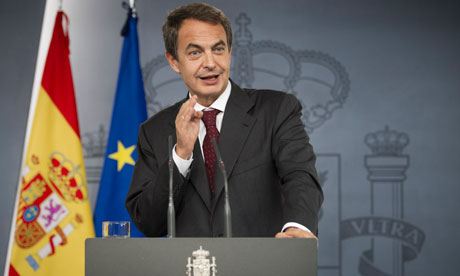Zapatero faces election defeat in Catalonia despite cabinet reshuffle
by editor | 2010-10-27 7:11 am
![]()
Spanish prime minister, already suffering a slump in approval ratings, is also plagued by dissent inside his Socialist party
[1]Sandrine Morel Madrid

The campaign for the regional election in Catalonia on 28 November got off to a discouraging start for Spain’s ruling Socialist party (PSOE). Opinion polls are predicting that its Catalan branch (PSC), in power since 2003, will suffer a heavy defeat at the hands of the centre-right nationalist Convergence and Unity party. This would be another blow for the embattled Spanish prime minister, José Luis Rodríguez Zapatero. It would also be a bad sign for the following two polls: the local elections in May 2011 and the general election the following year.
Zapatero, suffering abysmal approval ratings, is dogged by the consequences of the economic crisis and a rate of unemployment of more than 20%. By the end of the year he wants to push through plans to raise the retirement age from 65 to 67.
The most recent polls suggest that even PSOE voters are losing patience and the gloom seems to be infecting members of the party itself, of which Zapatero is general secretary. At the beginning of this month PSOE militants in Madrid inflicted a terrible snub on the prime minister. He wanted the health minister, Trinidad Jiménez, to run against the powerful leader of the Madrid regional government, Esperanza Aguirre, of the rightwing People’s party. Tomás Gómez, the top PSOE figure in the capital, refused to accept this, called for a primary and won the run-off with a 52% share of the vote.
On 8 October a statement by the head of the Castilla-La Mancha regional council, José María Barreda, confirmed party dissent. After 27 years in power there, the PSOE is under threat from the right. Barreda proposed an eight-year limit on any term of office, the implication being that Zapatero should step down in 2012.
Zapatero moved swiftly to quell the discontent with a cabinet reshuffle last week, bringing in several leftwing figures to bolster traditional support. Alfredo Pérez Rubalcaba, the interior minister, also takes over as deputy leader and government spokesman. The entry of Ramón Jáuregui, a leading Basque politician, probably reflects Zapatero’s determination to capitalise on his successes against Eta, the Basque terrorist organisation.
A member of the General Union of Workers, Valeriano Gómez, becomes minister of labour, with the task of gaining union support for pension reform. Two ministries, emblematic of Zapatero’s social policies, have been scrapped: equality and housing.
This article originally appeared in Le Monde
- : http://www.facebook.com/sharer.php?u=http%3A%2F%2Fwww.guardian.co.uk%2Fworld%2F2010%2Foct%2F26%2Fzapatero-setback-catalonia-elections&t=Zapatero%20faces%20election%20defeat%20in%20Catalonia%20despite%20cabinet%20reshuffle%20%7C%20World%20news%20%7C%20Guardian%20Weekly&src=sp
Source URL: https://globalrights.info/2010/10/zapatero-faces-election-defeat-in-catalonia-despite-cabinet-reshuffle/